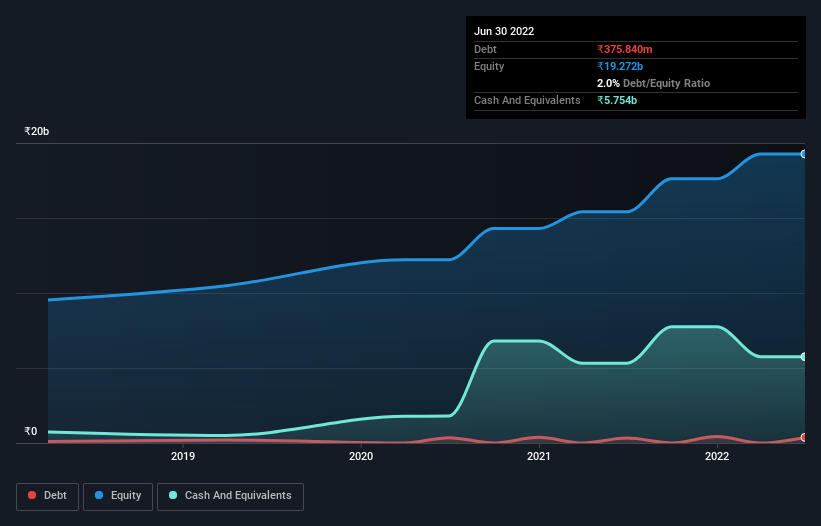We Think Sumitomo Chemical India (NSE:SUMICHEM) Can Manage Its Debt With Ease

Legendary fund manager Li Lu (who Charlie Munger backed) once said, 'The biggest investment risk is not the volatility of prices, but whether you will suffer a permanent loss of capital.' It's only natural to consider a company's balance sheet when you examine how risky it is, since debt is often involved when a business collapses. As with many other companies Sumitomo Chemical India Limited (NSE:SUMICHEM) makes use of debt. But should shareholders be worried about its use of debt?
Why Does Debt Bring Risk?
Debt and other liabilities become risky for a business when it cannot easily fulfill those obligations, either with free cash flow or by raising capital at an attractive price. Part and parcel of capitalism is the process of 'creative destruction' where failed businesses are mercilessly liquidated by their bankers. However, a more frequent (but still costly) occurrence is where a company must issue shares at bargain-basement prices, permanently diluting shareholders, just to shore up its balance sheet. By replacing dilution, though, debt can be an extremely good tool for businesses that need capital to invest in growth at high rates of return. The first thing to do when considering how much debt a business uses is to look at its cash and debt together.
See our latest analysis for Sumitomo Chemical India
What Is Sumitomo Chemical India's Debt?
The image below, which you can click on for greater detail, shows that at March 2022 Sumitomo Chemical India had debt of ₹375.8m, up from ₹326.4m in one year. However, it does have ₹5.75b in cash offsetting this, leading to net cash of ₹5.38b.

A Look At Sumitomo Chemical India's Liabilities
Zooming in on the latest balance sheet data, we can see that Sumitomo Chemical India had liabilities of ₹10.2b due within 12 months and liabilities of ₹609.7m due beyond that. Offsetting this, it had ₹5.75b in cash and ₹8.79b in receivables that were due within 12 months. So it actually has ₹3.72b more liquid assets than total liabilities.
Having regard to Sumitomo Chemical India's size, it seems that its liquid assets are well balanced with its total liabilities. So it's very unlikely that the ₹243.0b company is short on cash, but still worth keeping an eye on the balance sheet. Simply put, the fact that Sumitomo Chemical India has more cash than debt is arguably a good indication that it can manage its debt safely.
Also positive, Sumitomo Chemical India grew its EBIT by 25% in the last year, and that should make it easier to pay down debt, going forward. When analysing debt levels, the balance sheet is the obvious place to start. But ultimately the future profitability of the business will decide if Sumitomo Chemical India can strengthen its balance sheet over time. So if you're focused on the future you can check out this free report showing analyst profit forecasts.
Finally, a business needs free cash flow to pay off debt; accounting profits just don't cut it. Sumitomo Chemical India may have net cash on the balance sheet, but it is still interesting to look at how well the business converts its earnings before interest and tax (EBIT) to free cash flow, because that will influence both its need for, and its capacity to manage debt. During the last three years, Sumitomo Chemical India produced sturdy free cash flow equating to 53% of its EBIT, about what we'd expect. This cold hard cash means it can reduce its debt when it wants to.
Summing Up
While we empathize with investors who find debt concerning, you should keep in mind that Sumitomo Chemical India has net cash of ₹5.38b, as well as more liquid assets than liabilities. And we liked the look of last year's 25% year-on-year EBIT growth. So is Sumitomo Chemical India's debt a risk? It doesn't seem so to us. Above most other metrics, we think its important to track how fast earnings per share is growing, if at all. If you've also come to that realization, you're in luck, because today you can view this interactive graph of Sumitomo Chemical India's earnings per share history for free.
At the end of the day, it's often better to focus on companies that are free from net debt. You can access our special list of such companies (all with a track record of profit growth). It's free.
New: Manage All Your Stock Portfolios in One Place
We've created the ultimate portfolio companion for stock investors, and it's free.
• Connect an unlimited number of Portfolios and see your total in one currency
• Be alerted to new Warning Signs or Risks via email or mobile
• Track the Fair Value of your stocks
Have feedback on this article? Concerned about the content? Get in touch with us directly. Alternatively, email editorial-team (at) simplywallst.com.
This article by Simply Wall St is general in nature. We provide commentary based on historical data and analyst forecasts only using an unbiased methodology and our articles are not intended to be financial advice. It does not constitute a recommendation to buy or sell any stock, and does not take account of your objectives, or your financial situation. We aim to bring you long-term focused analysis driven by fundamental data. Note that our analysis may not factor in the latest price-sensitive company announcements or qualitative material. Simply Wall St has no position in any stocks mentioned.
About NSEI:SUMICHEM
Sumitomo Chemical India
Engages in the manufacture and sale of household and public health insecticides, agricultural pesticides, and animal nutrition products in India and internationally.
Flawless balance sheet with solid track record.
Similar Companies
Market Insights
Community Narratives



